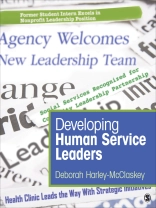This empowering text for human services students covers the skills and behaviors essential for leaders to manage themselves, their teams, and the organization. Using a unique coaching voice, the book follows a Reflection–Diagnosis–Prescription approach for leadership development with exercises built into the dialogue. The final chapter, Prognosis, offers a workbook-style exercise to help students make a personal change.
Tabela de Conteúdo
Part I. Leadership Development and Organizational Management at Work in the Human Services Professions
Chapter 1: Leadership in the Human Services and Workplace Vocabulary of Leaders and Managers
Leadership in Human Services
What is the Human Services Sector
The Human Services Leader: A Snapshot
The Study of Leaders in Human Services Organizations
Leading a Human Services Organization
Leadership Skill Sets Needed in the Human Services Profession
Guiding Your Leadership Journey
The Workplace Vocabulary of Leaders and Managers
Speaking a New Language
Borrowing Words from Other Professions
Business Vocabulary Translated in Human Services Speak
Chapter 2: Theories of Leadership and Management: Building A Philosophy of Leadership
The Complex Dynamics of Leading
The Process of Building a Philosophy of Leadership
Your Leadership Philosophy
Part II. Development of Self and Team
Chapter 3: Self-Management: Understanding Self and Managing Conflict
Understanding Self
Who Am I?
Understanding Styles
How Leaders Use Self-Knowledge
Managing Conflict
The Anatomy of Style Conflict Tendencies
A Different Look at Conflict
Managing Yourself and Diffusing Conflict
Chapter 4: Self-Management: Attitude, Values, Ethics, and Trust
Attitude
Reaction to the Negative
What is Your Mindset
Retooling for a Growth Mindset
Values
The Self-Aware Leader
Acting in Alignment with Values
Leadership Organizational Values
Ethics
The Judgments We Make
Defining Ethical and Unethical Behavior
Establishing A Culture of Ethics
Trust
Becoming Trustworthy
Optimal Work Environments
Chapter 5: Self-Management: Time, Personal Goals, and Organization
Time
Do You Really Manage Time?
Find Your Target
Becoming Intentional Through Planning
Personal Goals
Organization
The Pain of Living in Chaos
Where Are Your Organizational Trouble Spots?
Taming the Mess
Chapter 6: Organizational Management: Team Building, Management, and Motivation
Team Building
Your Team Experience
Work Team or Work Group
High Performance Teams
Management
Early Learning Experiences About Managing
The Job of a Good Manager
Motivation
Motivation Theory at Work
Extrinsically or Intrinsically Motivated
Finding and Maintaining Your Focus
Chapter 7: Organizational Management: How to Run a Meeting and Decision-making
How to Run a Meeting
Your Meeting Experience
Meeting Planner and Participants
Preparing for an Effective and Efficient Meeting
Decision Making
Your Experience with Group Decision-Making
The Steps in Decision-Making
The Tools of Decision-Making
Part III. Development of Organizations
Chapter 8: Organizational Management: Vision, Mission, and Strategic Planning
Panoramic View of an Organization
Vision
The Role of Values in a Vision
Values, the First Point of the Constellation of Excellence
Writing a Vision Statement
Mission Statement
Confusion and Inconsistency in the Workplace
Defining the Organization’s Purpose
Write It, Publish It, and Use It
Strategic Planning
Getting Advice to Achieve a Goal
SWOT Analysis Thinking
The Strategic Planning Process
Chapter 9: Organizational Management: Strategic Goals and Project Management
Strategic Goals
How Exciting New Strategic Goals Become Frozen
Evaluating a Strategic Goal for Organization Impact
Learning from Key Questions in Strategic Goal Implementation
Project Management
Why Projects Fail
Analyzing Your Last Group Project
How to Successfully Manage a Project
Chapter 10: Organizational Management: Processes, Growth Measures, and Performance Excellence
Processes
How Do Processes Impact You
Identifying the Activities in a Process
Monitoring the Impact of Processes
Growth Measures
Comparing Qualities of Organizations
Key Growth Areas of Human Services Organizations
The Leadership Role in Organizational Growth
Performance Excellence
From Individual Improvement to Organizational Improvement
Creating a Profile of Key Organization Information
Using the Profile to Achieve Excellence
Chapter 11: Self-Management: Communication as: Listening, Presentation, Electronic and Web-Based, and Performance Feedback
Listening
The Importance of Feeling Heard
What Type of Listener Are You?
Increasing Empathetic Listening Skills
Presentations
Potential of Presentation Impact
Rating the Impact of Your Presentation
How to be Memorable
Electronic and Web-Based Communication
The Gift and Curse of Technology
Measuring the Negative Impact of Technology
The Social and Safety Rules of Email and Electronic Devices
Performance
Your Experience and Receiving Feedback
Giving Performance Feedback to Yourself
The Feedback-Change Process
Part IV: Influence
Chapter 12: Multicultural Leadership, Politics and Influence, Collaboration, and Social Entrepreneurship
Multicultural Leadership
The Impact of Exclusion and the Call to Becoming Inclusive
Assimilation and Acculturation
Leading a Multicultural Team
Politics and Influence
Influential Leaders in Our Lives
Mapping Your Influence
Influence Tactics
Collaboration
The Process of Revealing Qualities of a Collaboration Partner
Success Factors of Collaboration
From Alliance to Collaboration
Social Entrepreneurship
The Tear in Your Eye, Lump in Your Throat, … Look What They Did!
Individual or Group. What Are the Skills and Needed Talents?
A Model and Success Variables Impact Social Entrepreneurship
Chapter 13: Prognosis: Your Future Leadership Growth
Prognosis
The Typical Resolution for Personal Change
Will You and Willpower be Able to Save the Day
Making the Plan to Grow New Leadership Skills
Sobre o autor
Deborah Harley-Mc Claskey, Ed. D., is an Associate Professor in the Department of Teaching and Learning in the College of Education at East Tennessee State University. For more than 30 years, she has led university departments, and served on boards of nonprofits, as well as directed service-learning coalitions and community leadership programs. For the last 15 years she developed, coordinated, and taught in the Interdisciplinary Minor in Leadership at ETSU. She infused leadership into the undergraduate curriculum in the College of Education. She taught in the Human Services program and developed courses for the Tennessee Regents Degree graduate program in Strategic Leadership. Her research interests include leadership assessments and the development and outcomes of youth leadership programs. She provides leadership training for many nonprofits in the surrounding community. She is a leadership consultant for Pal’s Business Excellence Institute as well as the Franklin Covey Organization — designing leadership learning experiences for local, national, and international organizations, training leadership teams as well as employee groups. She holds a doctorate in educational leadership and policy analysis from ETSU and masters and bachelor’s degrees from the University of South Florida.












